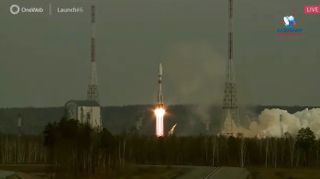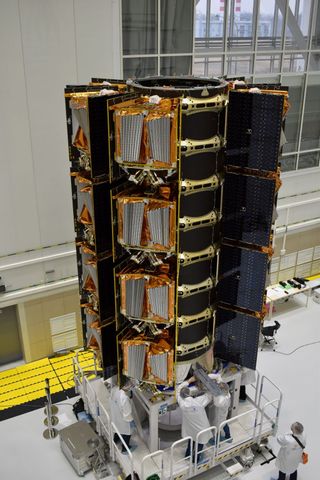Soyuz rocket launches 36 OneWeb internet satellites to orbit
It took about four hours for all the spacecraft to deploy.

An Arianespace Soyuz rocket launched 36 new OneWeb internet satellites into orbit tonight (April 25), further building the company's broadband constellation.
The rocket lifted off from Vostochny Cosmodrome in eastern Russia at 6:14 p.m. EDT (2214 GMT or 7:14 a.m. local time on Monday, April 26). If all goes to plan, this next clutch of satellites will fly to a near-polar orbit, joining a growing constellation at an altitude of roughly 280 miles (450 kilometers).
All 36 satellites were successfully deployed by about four hours after launch, Arianespace representatives said.
"OneWeb's mission is to bring internet everywhere to everyone, by creating a global connectivity platform through a next-generation satellite constellation in low Earth orbit," launch provider Arianespace said in a statement.
"Once deployed, the OneWeb constellation will enable user terminals that are capable of offering 3G, LTE, 5G and Wi-Fi coverage, providing high-speed access globally — by air, sea and land," Arianespace added, noting that OneWeb hopes to scale service by year's end to underserved, northern areas in the United Kingdom, Alaska, Canada, northern Europe, Greenland, Iceland and the Arctic.
The Soyuz used an "advanced dispenser system" from RUAG Space to deploy the payloads during this evening's four-hour mission, Arianespace added in a tweet Wednesday (April 21).

The flight, designated ST31, is the sixth mission Arianespace has launched on behalf of OneWeb. With this latest batch deployed, OneWeb now has 182 satellites in orbit, with eventual plans to have 650 satellites in the constellation. Called Launch 6 by OneWeb, the mission is the third for the company's "Five to 50" program, which aims to provide internet access for customers north of 50 degrees latitude by June 2021.
Get the Space.com Newsletter
Breaking space news, the latest updates on rocket launches, skywatching events and more!
"OneWeb's 'Five to 50' program aims to connect broadband data users in the Northern Hemisphere, with services covering the United Kingdom, Alaska, Northern Europe, Greenland, Iceland, the Arctic Seas and Canada," OneWeb wrote in a statement. "Service will be ready to start by the end of year, with global service available in 2022."
Flight ST31 is the third OneWeb launch since the company filed for Chapter 11 bankruptcy in March 2020. The company, now under ownership of the British government and the Indian telecom firm Bharti Global, has sharply reduced how many satellites it plans to incorporate into the next-generation constellation.
This story was updated at 6:35 p.m. EDT (2235 GMT) on April 25 with news of a successful liftoff, and again at 12:20 a.m. EDT (0420 GMT) on April 26 to state that all satellites deployed as planned.
Follow Elizabeth Howell on Twitter @howellspace. Follow us on Twitter @Spacedotcom and on Facebook.
Join our Space Forums to keep talking space on the latest missions, night sky and more! And if you have a news tip, correction or comment, let us know at: community@space.com.

Elizabeth Howell (she/her), Ph.D., is a staff writer in the spaceflight channel since 2022 covering diversity, education and gaming as well. She was contributing writer for Space.com for 10 years before joining full-time. Elizabeth's reporting includes multiple exclusives with the White House and Office of the Vice-President of the United States, an exclusive conversation with aspiring space tourist (and NSYNC bassist) Lance Bass, speaking several times with the International Space Station, witnessing five human spaceflight launches on two continents, flying parabolic, working inside a spacesuit, and participating in a simulated Mars mission. Her latest book, "Why Am I Taller?", is co-written with astronaut Dave Williams. Elizabeth holds a Ph.D. and M.Sc. in Space Studies from the University of North Dakota, a Bachelor of Journalism from Canada's Carleton University and a Bachelor of History from Canada's Athabasca University. Elizabeth is also a post-secondary instructor in communications and science at several institutions since 2015; her experience includes developing and teaching an astronomy course at Canada's Algonquin College (with Indigenous content as well) to more than 1,000 students since 2020. Elizabeth first got interested in space after watching the movie Apollo 13 in 1996, and still wants to be an astronaut someday. Mastodon: https://qoto.org/@howellspace
